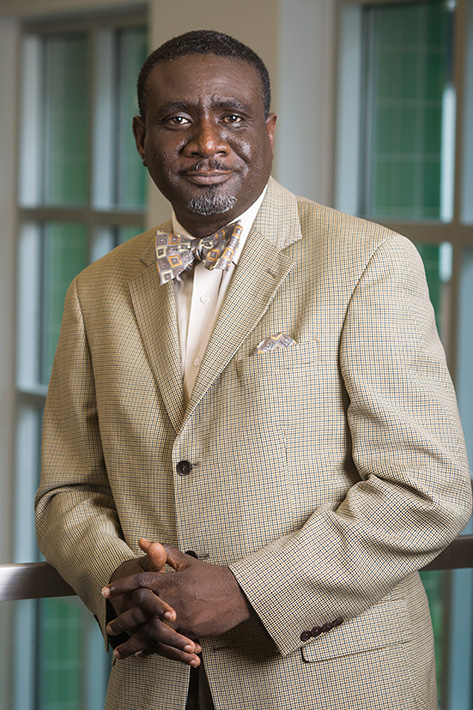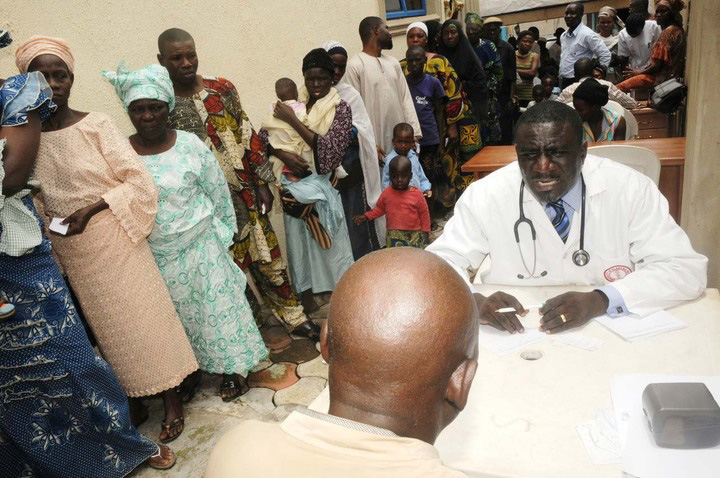 As a boy, Tolu Aduroja, M.D., M.P.H., longed for the days when he got to go to work with his mother, an obstetric nurse at the hospital in Ibadan, Nigeria. “I saw patients give birth and the joy on their faces, and I just loved it,” says Aduroja, an associate professor in the UAB Department of Psychiatry who specializes in child and adolescent psychiatry at UAB and Children's Hospital of Alabama. “I wanted to do that.”
As a boy, Tolu Aduroja, M.D., M.P.H., longed for the days when he got to go to work with his mother, an obstetric nurse at the hospital in Ibadan, Nigeria. “I saw patients give birth and the joy on their faces, and I just loved it,” says Aduroja, an associate professor in the UAB Department of Psychiatry who specializes in child and adolescent psychiatry at UAB and Children's Hospital of Alabama. “I wanted to do that.”Aduroja graduated from medical school at the University of Ibadan and began work as a general practitioner, but love brought him to the States in 1997. His wife, a pharmacist who was born in the U.S. and moved to Nigeria as a high schooler, had a great job offer in Atlanta. Aduroja took the opportunity to expand his horizons. “When I came to the U.S., my mind was made up that I wanted to work with people,” he says.
He began a medical residency in psychiatry in Atlanta while starting a master’s degree in public health at UAB. “The courses were offered on the weekend, so I would shuttle back and forth between Atlanta and Birmingham,” Aduroja says. He eventually moved to Birmingham to complete a fellowship in child and adolescent psychiatry at UAB, joining the faculty of the Department of Psychiatry in 2005, the same year he received his master’s degree in public health.
Home Again
Joy drew Aduroja to the medical profession, but pain brings him back to Nigeria. “You have to have money to get health care in Nigeria,” he says. “People know something is wrong, but they don’t do anything about it until it is too late.”For the past two years, Aduroja has traveled to Ibadan in the fall to offer free medical care. Along with three other Nigerian physicians (two of them fellow UAB alumni— Benjamin Blagogee, who earned a public health doctorate in 2003, and Ayodele Obuseh, who earned his doctorate in public health in 2007), Aduroja has founded an organization called Maternal Cords, with the mission of caring for mothers and children.
On their first visit, in September 2011, the small group saw more than 1,000 people. “We treated malaria, infestation, gastric infections, high blood pressure, hernias, and much more,” says Aduroja. “We promised people we were going to be doing this every year,” he says, but the patients, who had seen foreign medical groups pass through before, were skeptical. “They were shocked when we returned” in 2012, Aduroja says.
Word spread fast. A patient who had a surgical procedure in 2011 “heard we were back and told everyone in his neighborhood,” Aduroja says. “So then we had 10 surgical cases.” One woman, unable to conceive for 12 years, finally got a chance to be a mother after the team diagnosed and removed her fibroids.
The visiting doctors pay for the entire cost of the trips themselves, nearly $15,000 per year, but they did get a break on their last visit. The hospital director—Aduroja’s little brother, himself a physician—now subsidizes the cost of surgeries, which brings the expense down to $100 per procedure. The group’s next trip to Nigeria is scheduled for October 2-9, 2013. Aduroja says Maternal Cords also hopes to lead a program in Botswana before the end of the year.
 Healthy Lessons
Healthy Lessons
Acute treatments are desperately needed among Nigeria’s poor, but public health approaches are just as crucial, Aduroja notes. “When you are poor, you aren’t so selective about what you eat,” he says. “We Nigerians love fried foods and fatty foods, which is one reason we see so many cases of high blood pressure.” On his last visit, he did a physical exam for a man who turned out to have a blood pressure of 230/130. “He should have just slumped over and died at that pressure,” Aduroja says. He immediately admitted the man to the hospital for treatment.Obesity issues in the United States also occupy Aduroja’s attention. He is currently in the doctoral program in public health at UAB. Working at UAB’s Nutrition Obesity Research Center, he is looking at the connection between obesity in the Birmingham school system and eating disorders among children.
“I love to work with people,” Aduroja says. “Ever since I came to the U.S., it’s always been on my mind.”
This article originally appeared in UAB Magazine.